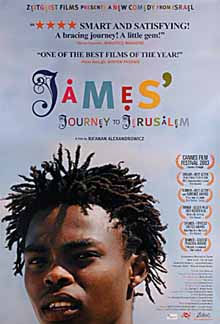
JAMES’ JOURNEY TO JERUSALEM
Israel, 2003, 91 minutes, Colour.
Siyabonga Melongisi Shibe, Arie Elias, Salim Daw.
Directed by Ra’anan Alexadrowicz.
An unexpected pleasure – though a rather caustic critique of modern Israeli materialistic goals (which are, of course, shared by so many cultures).
The opening credits offer a chant about pilgrims going to Jerusalem accompanied by brightly coloured paintings. These suggest something of an African myth, a jaunty and cheerful fairytale. But, this is not to be. James (Siyabonga Melangisi Shibe), a Zulu who has been sent to Jerusalem by his village before he becomes their pastor, is a really good young man, full of ideals and hopes. When he finds that immigration interns him and he is bailed out (because of this apparent goodness) by black market labour organisers to work and pay off his debts, he is puzzled, resigned but earnest and hard-working. He even befriends the crusty old father of the boss who does not want to relinquish his fallen down house and shambling garden to million dollar developers.
But, so the screenplay says, no one should be a ‘frayer’. That is, no one should be manipulated by others – in, fact, you should do the manipulating! This is the temptation that James succumbs to (egged on by fellow workers and the local reverend who is prone to want James’ donations) and which he has to face if he wants his integrity back (and a visit to Jerusalem which always seems to elude him).
This is a film where Israelis are criticising themselves, holding up a model for good living who can transcend the material temptations. But, because James is so nice, you tend to watch this critique while smiling.
1. An entertaining story of an innocent abroad? An African in Israel? The comic side, the serious and critical side?
2. The Israeli locations, Tel Aviv, the poorer side of Israel, the city? The final glimpse of Jerusalem?
3. The credits sequence, the colour paintings, the fable look of the drawings, the colour? The African abroad? The folk song and chant? The spirit of optimism about the song and the pilgrimage to Jerusalem?
4. The introduction to James, the African, simple (the Candide kind of character)? His high hopes, sent by the village, his being the next pastor? The encounter with the passport control, the offhand attitude of the woman, her criticism, her not listening to his biblical quotations, thinking he was a con man? Putting him in prison?
5. James in prison, his bewilderment? The other prisoners? Their attitude towards him? His being sustained by his faith?
6. Shimi, his arrival in the prison, his attitude towards the prisoners, overseeing the work force, the illegal immigrants, the choices? The discussions with James, his being impressed by James’ attitude, bailing him out? James not realising he was being trapped, the debt to Shimi, having to work to pay it off? His decision to do this?
7. James, the men in the house, the rules, the Balkan overseer and his harsh attitudes? Playing cards? The men virtually in prison? The other men, their characters, wanting to make money, more offhand, less reliable?
8. James and his work, in the fields, the factories? His going to Shimi’s father? Salah and his attitudes, initially critical, his descriptions of James? James and his innocence, breaking through Salah’s prejudices, his diligence in cleaning the house, talking to Salah, making the garden? Salah and his backgammon and James throwing the double-sixes?
9. Shimi and his having to allow James to go to Salah, Shimi and his wanting his father to move out, to sell the site, the building plans, the million dollars?
10. James, Salah relying on him, Salah’s personality, age, experience, not wanting to move, dislike of his son, double dislike of his daughter-in-law? His hold over James and the double-sixes, cheating with his friends and relatives?
11. The concept of the frayer, not being taken advantage of? Everybody exhorting James not to be a frayer? His working for Shimi’s wife, friends? His doing double shifts? The money?
12. His going to church, religious, enjoying the community, the singing, the Africans praying? The minister, his appeals for money? His later appeals to James when he had money, relying on James’ generous donations? Mercenary?
13. James and his organising of the business, undercutting Shimi, arranging all the workloads? The phone calls, the mobile? His being able to outdo Shimi? His lazy friend and his work for Salah? Salah encouraging him? Their deal and James shooting the double-sixes?
14. James, material benefits, going to the supermarket, buying goods, clothes, the television and everybody watching, the supervisor and his smashing the television, Shimi and his ousting him and sending him back to Europe, putting James in charge?
15. The effect on James, his becoming materialistic, the challenge to his faith?
16. The party, Salah agreeing that the sale could go ahead, James and his relationship with all the Israelis? The revelation of what he had been doing, Shimi and his anger, getting him arrested?
17. James in jail again, handcuffed – and the drive towards Jerusalem, his asking for the photograph, handcuffed yet the police taking the photo?
18. The innocent abroad, the possibilities for materialistic corruption, the challenge to faith? The importance of the critique of the materialism of the Israelis, getting money, double deals, illegalities – while the setting is Israel, the criticism is worldwide?